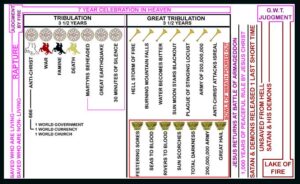“When a strong man armed keepeth his palace, his goods are in peace: But when a stronger than he shall come upon him, and overcome him, he taketh from him all his armour wherein he trusted, and divideth his spoils. He that is not with me is against me: and he that gathereth not with me scattereth.” Luke 11:22-23*
Adam was born immortal. He had never suffered sickness, disease, weather conditions or anything under the curse of the law. When he fell to an announcement of the enemy, he was spoiled of his instruments of spiritual warfare (2 Cor 10:4). He placed a value on a second opinion and was talked out of his authority (Rom 5:12). He never knew condemnation, but got more than a mouthful after making a crucial mistake that would affect the whole world. The earth would have to wait to be replenished (Gen 1:28).
The enemy had a history of giving men words to have individualism by his divisional tactics 1Kings 22:22). From the time of Cain to the time of Moses, few people showed evidence of receiving God’s word and lived it (Ex 4:12). Few people shook off the verbal condemnation and showed the boldness of unseen God given power. Men like Elijah and Elisha knew about the availability of this authority that was a provision for men, before the appearance of Jesus (Heb 11).
Jesus came to give an example of showing this authority given to men. The enemy never had the right to have it. He doesn’t have the right to keep it. We spoil him by taking back the authority Jesus said we have (Mark 16:17, 18). The disciples did it around Him on His word that it was possible (Luke 10:17-19). He gave his Holy Spirit to the apostles who demonstrated the power that God had given to men (Acts 3:3-7). Today, with the leading of the Spirit and the Presence of God in our words, we can take back these instruments of war from an enemy that was defeated long ago on the cross (Col 2:15).
Because death and life are in the power of the tongue, God wanted us to have the creative life in our words ever since the days when Adam named the animals. When Moses came on the scene, all God had to use was a rod (Ex 4:7). From the beginning he would give excuses, ashamed of talking to Pharaoh (Ex 4:10). He didn’t know the potential of his unlimited backup. He allowed God to use his rod, but held back his mouth. Whether it was used to get water from a rock, or lifted up in war, the wood ‘cried out’ for him (Ex 17:6, 9-11). In the day at Kadesh, God would challenge him once more to use his mouth (Ex 20:8). But, he did things the old-fashioned way and beat on it. A demonstration that would have been powerful and contagious, resulted without an example of words that would have been repeatedly seen more of in the lives of God’s men.
Jesus taught us how to fight with words (Matt 16:19). The apostles followed up with more lessons for the believer (Acts 8:6-8). Many men of God are following in the same footsteps today (James 5:14, 15).
We are here to gather the spoils of the enemy like Jesus did. If we gather with him in agreement, we encourage others to come and gather. If we sit idle, the announcements that have been in books and newspapers of a dead god, or the god of ‘I was’ will be the only evidence that some people will get. If we start off with small things like headaches and a peaceful night’s sleep, we will exercise our faith and build more spiritual muscles to extinguish any reports of the enemy (Is 53:1). Now that we’ve looked into the Word, and the defeat has been announced like the lepers discovering the spoils in Samaria (2 Kings 7:8), we will testify what God has done with us and for us, and announce His living goodness for everyone else to gather the spoils (2 Kings 7:16, Rom 8:31).
*This is not a suggestion























